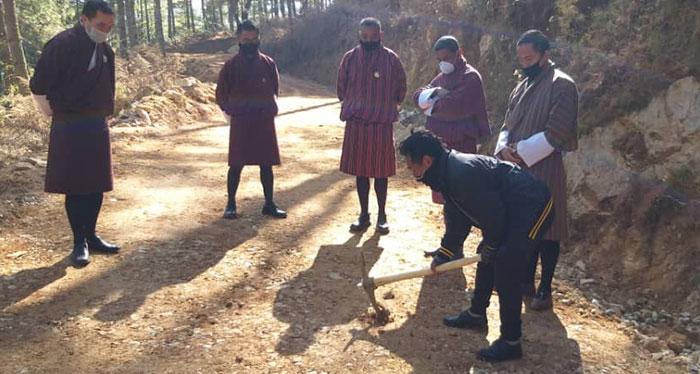Chhimi Dema
The project to improve farm roads with granular sub-base (GSB) has begun with work on 162 roads already underway.
GSB consists of a uniform mixture of granular material placed on a prepared subgrade and uniformly moistened, shaped and compacted. It acts as a drainage layer for the pavement to avoid excessive wetting and weakening of subgrade.
Gross National Happiness Commission’s (GNHC) secretary, Thinley Namgyel, said that the government undertook reprioritisation of the planned activities because of Covid-19.
He said that enhancing food security, job creation and skills development, local economy, using local materials, and reducing dependency on imports were prioritised.
“The farm road improvement project was undertaken in light of multiple benefits it could bring to the people,” he said.
A review found that there were more than 9,000km farm roads in the country and the resource required for the improvement was projected at about Nu 16 billion.
The review was carried out by GHNC in consultation with the agriculture ministry and the local governments.
“Given the huge resource requirement, improvements of the farm roads were planned in phases,” Thinley Namgyel said.
Phase I includes one farm road for each gewog, phase II focuses on improving three farm roads (but implementation subject to the progress of phase I) and phase III will focus on the remaining farm roads.
The budget allocated for the construction of one km of GSB and drainage is Nu 1.667 million.
A total budget of Nu 2.5 billion was allocated for improvement of more than 1,500km farm roads in the first phase of the project. A farm road each was identified from the gewogs, except from Soe, Lingshi, Naro, and Laya.
The government approved the implementation of the project’s first phase in September 2020.
“Considering the importance of this project for the overall economic development of rural places and in terms of improved connectivity of farmlands to the market, the government will ensure regular monitoring of the project sites for quality-checking,” Thinley Namgyel said.
The monitoring is carried out jointly by the human settlement ministry and GNHC.
Thinley Namgyel said that there were numerous challenges while implementing improvement works on farm roads, such as poor bidder turnout due to the mandatory seven-day quarantine requirements, difficulties in finding skilled Bhutanese workers, and lack of required materials on time.


